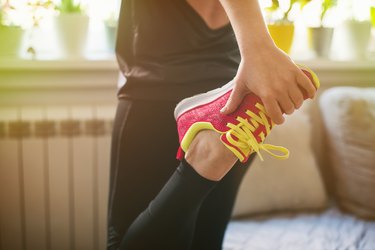
Mustering up the effort to exercise when you have PCOS isn't always easy. Oftentimes symptoms like joint inflammation, all-over fatigue and even heightened feelings of anxiety and depression can feel like a wet blanket that smothers any possible motivation to get moving.
And yet, it's worth pushing yourself to be active.
PCOS, or polycystic ovary syndrome, which is caused by a reproductive hormone imbalance, can lead to issues like infertility, weight gain and the development of painful ovarian cysts. But regular workouts can be a powerful tool for managing your symptoms.
Here's a look at why exercise is so beneficial for PCOS, the best workouts to try (and whether there are any you need to avoid) and how to get started with an exercise program — even if you're a fitness newbie.
Exercise for PCOS: Can It Help?
Not only can regular exercise help PCOS, experts agree it's one of the best ways to protect your health and feel your best. Here are some of the ways exercise can be helpful if you have PCOS.
Exercise May Ease Symptoms
"Exercise improves virtually everything," says ob-gyn Felice Gersh, MD, founder and director of the Integrative Medical Group of Irvine and author of PCOS SOS Fertility Fast Track — and that includes PCOS symptoms, she notes. "It improves sleep, mood, energy, digestion and self-esteem."
Research backs this up. For people with PCOS, regular physical activity improves physical functioning, overall health, social functioning and mental health, per a February 2019 review of 27 studies published in the journal Systematic Reviews.
It Can Help You Manage Your Blood Sugar
While the exact cause of PCOS isn't fully understood, experts suspect that part of the culprit is excess insulin production, which can lead to too-high levels of androgen hormones, systemic inflammation and weight gain.
It's those issues that can ultimately affect your menstrual cycle and your fertility. And they can also up your risk for other complications, like metabolic syndrome, diabetes and sleep apnea, according to the Mayo Clinic.
Regular physical activity can help keep your blood sugar levels in check so you're less prone to insulin resistance.
Related Reading
Exercise Promotes Weight Loss
While exercise alone hasn't been shown to lead to weight loss for people with PCOS, it can improve body fat distribution and insulin resistance and lower the risk for heart disease, according to a March-April 2011 analysis published in Human Reproduction Update.
And when exercise is combined with a healthy diet, it can help with weight loss — which can lower androgen levels and potentially get your periods back on track and improve your chances of getting pregnant, as well as reduce acne and excess hair growth, per the American College of Obstetricians and Gynecologists (ACOG).
You don't need to lose tons of weight — losing just 10 percent of your body weight might be all it takes to reap the benefits, according to the Office on Women's Health. If you're 180 pounds, that's a loss of 18 pounds.
Related Reading
It May Improve Your Mood
Last but not least, exercise offers emotional benefits, too.
PCOS statistics show that having PCOS can put a damper on your self-esteem and lead to depression and anxiety. But physical activity is a known mood-booster, and it can go a long way toward easing some of those feelings and improving your overall quality of life, per an October 2017 review published in the Saudi Journal of Sports Medicine.
"The mental health benefits are another reason to incorporate a consistent exercise program if you're dealing with stress, depression, low self-esteem or poor body image," says Grayson Wickham, PT, DPT, CSCS, founder of the digital mobility and flexibility platform Movement Vault.
Related Reading
OK, but Are There Any Downsides?
Regular exercise is one of the best ways to manage your PCOS symptoms, especially when used as part of a weight-loss program. So there's no reason why you shouldn't do it, Wickham and Dr. Gersh say.
That said, it's worth taking extra care when you're first starting out, especially if you want to use a few pounds or haven't been active for a while. If you have PCOS, you may experience a "higher incidence of injuries and fatigue," Dr. Gersh says.
The key is easing into exercise gradually and doing what feels best for your body. Some mild soreness and fatigue is normal after exercising, but if the pain is severe or doesn't get better with time or you start to feel seriously worn out, those are signs to back off and talk to a health care professional
The Best Workouts for PCOS — and How to Get Started

There's no single exercise that's best for PCOS. Ultimately, your goal should be to find activities that you enjoy and can do on a regular basis — aiming to get at least 150 minutes of moderate activity per week, according to the physical activity guidelines from the U.S. Department of Health & Human Service (HHS).
"General activity guidelines are a good place to start if you're getting into exercise," Wickham says.
Aim to get a mix of the following activities, per the HHS physical activity guidelines:
Aerobic Exercise
Walking, jogging, cycling, swimming and elliptical training can all be great options for people with PCOS, per the research in Systemic Reviews. If you've been exercising regularly and want to crank things up, high-intensity interval training (HIIT) can be a good choice.
People with PCOS who underwent a 10-week HIIT program improved their insulin resistance, lowered their body fat and increased their muscle mass, according to a small, preliminary September 2015 study in PLOS One.
"It's an excellent option to burn more calories in less time," Dr. Gersh says.
Start Here
Resistance Training
Working out with weights can yield big benefits.
People with PCOS who performed resistance exercises three times a week for four months improved their hormone levels and fasting blood sugar as well as lost belly fat and gained muscle mass, per a April 2016 study in the journal Medicine and Science in Sports and Exercise.
Start Here
Flexibility Work
Activities like yoga can help improve blood sugar levels, according to a September 2018 paper published in the journal Endocrinology and Metabolism. Plus, yoga is also generally beneficial to your mood; in both the short and long term, it can boost positive feelings, while decreasing the symptoms of anxiety, per a November 2019 study in the Journal of Psychiatric Practice.
Start Here
Are There Any Exercises to Avoid if You Have PCOS?
PCOS itself doesn't pose a limit on the kinds of activities you can do.
"Any type of exercise that fits your goals, makes you feel good and that you like to do is the exercise and workout type you should be doing," Wickham says. "I've worked with PCOS patients who regularly do lighter exercises like yoga and others who do high-intensity workouts like CrossFit," he notes.
Start Slow
Still, it's important to take your fitness level into consideration. If you're new to exercise, and especially if have weight to lose or joint pain, start slow.
"Initially, avoid anything too strenuous or potentially damaging to your joints or back," Dr. Gersh says. "It's best to start with walking and light weights."
It's never a bad idea to start off by consulting your doctor or working with a doctor of physical therapy or certified personal trainer with a knowledge of PCOS.
"Any type of exercise that fits your goals, makes you feel good and that you like to do is the exercise and workout type you should be doing."
Watch for Discomfort or Pain
Other rules of thumb to keep in mind: You should avoid any type of activity that causes pain, numbness or dizziness while you're exercising or afterward, Wickham says.
"If you're feeling really exhausted you might need to take a break during your workout or take a rest day. Don't be afraid to scale back if you're not up to a challenging workout that day," he says.
Be Patient
As your fitness improves, you can gradually up the intensity to keep things challenging. Above all, remember to be patient. If you find an activity you love and can stick with it, over time, you'll likely notice an improvement in your symptoms.
"Consistency and persistence will pay off," Dr. Gersh says.
Is this an emergency? If you are experiencing serious medical symptoms, please see the National Library of Medicine’s list of signs you need emergency medical attention or call 911.